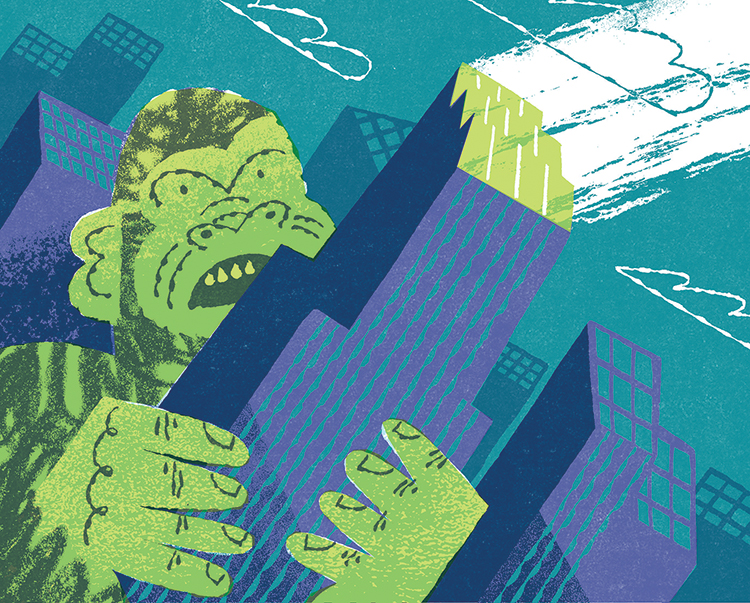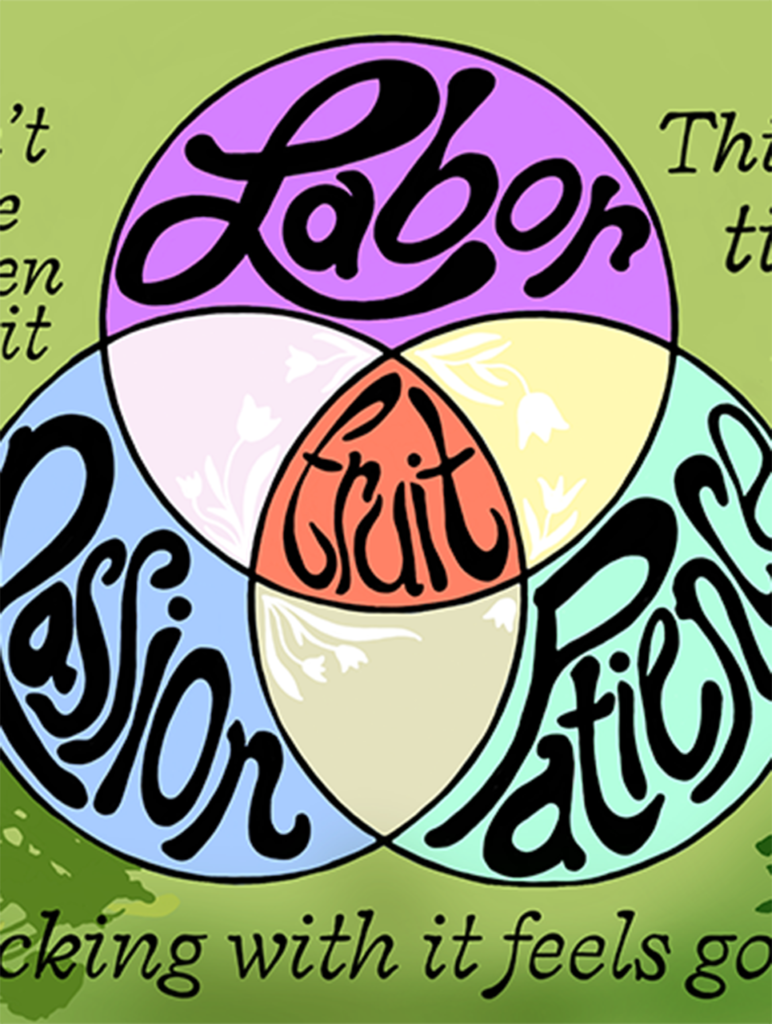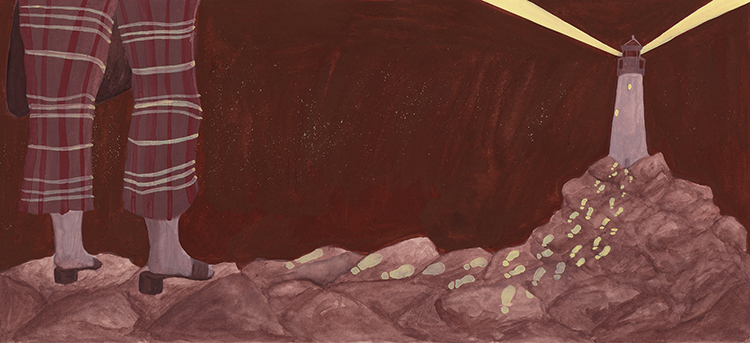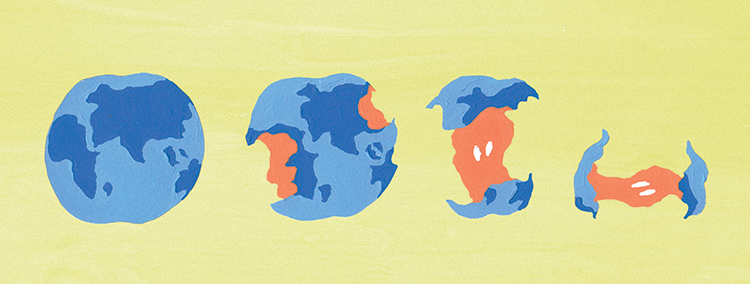Illustration by Carter Mulcahy
The Body Politic
interview by Heather Shayne Blakeslee
In her book “The Wrath of Capital: Neoliberalism and Climate Change Politics,” scholar Adrian Parr explores the interconnected nature of capitalism, political power and the systemic abuses foisted upon people and planet when the accumulation of money, power and possessions is our primary motivation.
You write early on in the book, “The more leaders in the sustainability movement proclaim that the only realistic way forward is to hop into bed with the free market, the more the formal structure of the opposition is compromised.”
AP: The way in which a capitalist system works… is inherently violent. It’s premised upon exploitation, it’s premised upon oppression, it’s premised upon private property relations. And it’s a system that really also only works as long as we’re advocating for endless economic growth. So, I’m saying that that system is part of the problem with environmental degradation… With climate change, a lot of the solutions that we’re trying to come up with are actually part of that model. …
The thesis put forward, say, by someone like Paul Hawken, the “natural capitalism” thesis, the “greening of the economy” idea, the idea of cradle to cradle—that we can keep going the way we’re going and producing endless commodities just as long as they can be produced in a way that’s more green friendly… I think it’s just a displacement activity. I think it makes us feel good, but we don’t produce any real change.
When I’m avidly recycling things in my home, hauling the bin out, I’m doing all those things because we should do those things, but I have no illusions around the fact that that in and of itself is not going to really produce the kind of change that we need.
What is the alternative in your mind to that structure of capitalism?
AP: I think we need to start experimenting with more collectivist ways of living with one another—and there are lots of really interesting examples of that out there in the world at the moment… After the housing crisis, there are a lot of examples of people recognizing that they can’t necessarily afford to buy a home… So, they’re collectively coming together and purchasing a property with other people, and it’s making the whole system much more affordable. I used to squat many, many, many years ago, and it’s the same kind of thing: The property was abandoned, no one was using it, [it] was falling apart, and we moved in, and we looked after it, we took care of it, we all helped out to do the things we had to do in terms of upkeep, and in my view that was a win-win. Instead of having the whole building fall apart, we made good use of it, and why not? Then you have collective models that are really flourishing in Detroit, for example. And they’re dealing with issues around food scarcity, but also issues around massive urban shrinkage, as a result of the deindustrialization, so on and so forth, at the end of the last century.
I’m glad you’re talking about Detroit, because that’s a city that came to mind when you were talking about the housing crisis. There’s so much housing stock there, and also many, many people who are homeless, which is a lose-lose rather than a win-win.
AP: Yeah, and I think what stops [us] is: We keep trying to squeeze everything into this capital relation around property relations—around privatization. So if we can’t privatize it, or sell the property to another property owner, then we just leave it there to rot, and that’s a deeply troubling way to address some of these issues. And it’s also not thinking about the ways in which environmental, social, economic, cultural and political issues are all interrelated phenomena. And I think we have to be very careful of trying to artificially extract the environmental issues from all those other issues.
You also mention that foreign investment and infrastructure, especially in places where they may not have the capital to invest themselves, has the potential to essentially be a new form of colonialism. Africa, for instance, has the potential to be a solar powerhouse—but who owns the structures, who owns the patents?
AP: Yes, I spent a lot of time in Africa working with water issues there—there are whole sections of the African continent there that are being handed over to European entities to set up solar panels to power the energy needs of Europe… and that’s just one example of that. So, what’s also difficult, tricky, in African countries, is—as a result of the residues of colonialism—you’ve ended up with a system that’s incredibly corrupt, that lacks transparency, that’s filled with bribery. So, you have these really powerful socio-economic elites in positions of incredible power, and they’re able to line their pockets, but the average person in Africa is living in abject poverty. I’ve spent a lot of time in the slums of Nairobi. Most of those people don’t reap or sow any of the benefits of these new initiatives.
You believe that corporate entities are gradually increasing “their monopoly over life systems.” We’re talking about really basic things like water.
AP: Two companies own 70 percent of the globalized private water resources around the world. … It would cost about $30 billion to provide everyone in the world with access to clean water. And currently, people are spending $100 billion a year purchasing bottled water. So you get a real picture of these kinds of distortions that are occurring throughout the world.
And of course, the world banks—a third of their water supply lines to our underdeveloped countries comes with the condition of privatizing their water resources. So that’s just putting them in a terrible stranglehold. So, it’s these kinds of initiatives, where people have a gun that’s put to their head, governments have a gun that’s put to their head… they’re already in a disadvantaged situation, and it’s all premised upon the supposed benefit that comes with a system of privatization, which I really don’t think is the way forward.
It also affects clean air—at the top of the list of things we can’t live without—the United States is exporting its pollution to China and to other countries.
AP: Meanwhile, [it] floats back over the seas, to the West Coast, where L.A.’s now alarmed… It does bring home that fact [that] we’re all in this together, and we’ve got to cooperate… Cooperation inherently means that we’re collaborating with one another… We’re working as equals in the pot together… a collectivist approach. So, we’re fooling ourselves if we try to define cooperation as another system premised upon property relations and privatization. Those two things are a contradiction.
You make a radical proposal at some point: What if we didn’t clean up disasters? From an advocacy standpoint, people don’t respond to anything but a disaster. We’re not hardwired to do it.
AP: I like this question. I followed public opinion [after the BP oil spill], and for the first time in U.S. history public opinion dramatically shifted—environmental concern had to be ahead of issues of oil security… I started looking at all of the advertisements of BP and just looking at the newspapers—and what we were being consistently presented with was the cleanup. That was the dominant message that was getting out, and there were huge amounts of money from BP for rebranding itself—and I thought, “Oh my goodness gracious me, it’s only taken them three months to shift popular opinion back.” And it still hasn’t finished being cleaned up.
The problem is, everyone has been presented withthis idea [that even] the worst oil spill in U.S. history can be cleaned up. And that is so troubling to me, that we’re so qu
ick to forget. … We’re not just fickle. We invest our energy in things that make us feel better… If we can recognize that that’s what’s going on, then maybe we need to feel bad for longer periods of time, because that seems to be the only thing that actually motivates us and stirs forth a collectivist impulse to say, “No! Stop. Enough’s enough.” When things change slowly, people are slow to change. When things change dramatically, people kind of rally around and they overcome their differences, and they recognize things that they share in common. And that is what’s required to produce real change.
A native of Sydney, Australia, Adrian Parr is a professor at the University of Cincinnati, where she is director of the Charles Phelps Taft Research Center. In 2013 she was appointed co-chair of Water Access and Sustainability at UNESCO.











